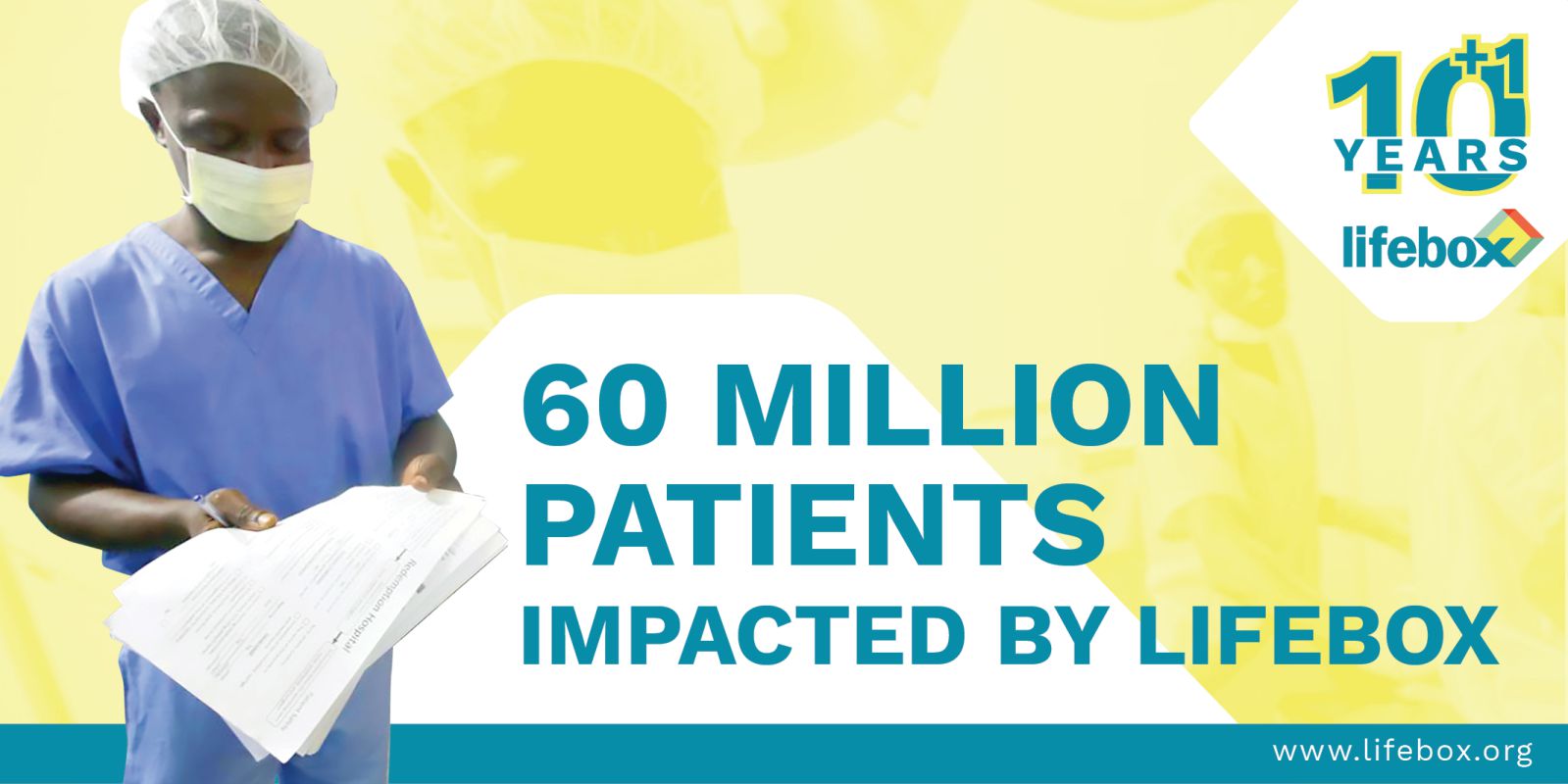
Celebrating 10 + 1 Years Saving Lives Through Safer Surgery
Marking a decade of safer surgery and anesthesia
Lifebox is celebrating ten – plus one – years of saving lives through safer surgery.
As we mark more than a decade of making surgery and anesthesia safer worldwide, we wanted to share the milestones that we have achieved, together, so far. Thank you to every one of you who has been part of the Lifebox story. And Happy Anniversary.

60 MILLION SURGERIES MADE SAFER
We believe that everyone has the right to safe surgical care.
Every year, more than four million people die following surgery – the greatest contributor to death worldwide after heart disease and stroke.1 Millions more suffer from complications and morbidities. Lifebox was founded to tackle the global crisis of unsafe surgery.

"As a surgeon, it is always heartbreaking when a child dies during surgery. Knowing that had they been born in a different place they would have had access to the necessary care is a difficult burden to bear. We desperately need to focus on safe pediatric surgical care."
Professor Miliard Derbew, pediatric surgeon, Rwanda, Lifebox Global Governance Council member
Today, we make surgery safer through tools, training, and partnerships. We focus on three core areas – anesthesia safety, surgical teamwork, and reducing surgical infection – to address critical gaps in surgical systems. So far, our work has made 60 million surgeries safer. Find out more.

32,000 PULSE OXIMETERS DISTRIBUTED
Since 2011, Lifebox has distributed over 32,000 pulse oximeters to healthcare providers in 116 countries for safer anesthesia and critical care.
A pulse oximeter is an easy-to-use but essential device for monitoring oxygen levels in the blood. It is the only piece of equipment included on the WHO Surgical Safety Checklist and represents the minimum standard for safe anesthesia. Despite this, thousands of anesthesia providers around the world lack access to pulse oximetry – putting patients lives at risk. Lifebox is dedicated to closing this gap.
"The impact of Lifebox has been that we no longer provide anesthesia without a pulse oximeter, we have understood that without it, anesthesia is very dangerous. I can honestly say today, that there's almost no provision of anesthesia, no anesthesia at all, provided without a pulse oximeter, and this is thanks to Lifebox".
Professor Eugene Zoumenou, Chief of Anesthesia at the Hospital for Mothers and Children, Cotonou, Benin, and Director of Anesthesia Education, University of Abomey-Calavi.

IMPACTED 100,000 PATIENTS THROUGH OUR SURGICAL INFECTION REDUCTION PROGRAM: CLEAN CUT
Surgical site infections are a common and devastating complication of surgery. In low- and middle-income countries, surgical patients are twice as likely to suffer from infection than a patient undergoing surgery in the United States.2
The Lifebox Clean Cut program reduces deaths and complications in patients caused by surgical site infections (SSIs) by improving adherence to six essential infection prevention practices. Clean Cut has shown a 35% infection reduction. As a result, we are scaling this work across four countries.
“The morbidity and mortality following surgical site infection is devastating, especially in a country like ours where resources are limited and we are short on personnel. It is essential that we continue to implement a well-designed system to keep safe surgical practices. Clean Cut…makes it clear that it is not only the skill of the OR staff that can save lives, but the adherence to the set forth safety standards as well.”
Dr Assefa Tesfaye, St Peter’s Specialized Hospital – Addis Ababa, Ethiopia

11,000 HEALTHCARE PROVIDERS TRAINED
Training is at the heart of Lifebox’s work. To date, 11,000 healthcare providers have been trained through 280 workshops on surgical and anesthesia safety – whether it is a workshop on pulse oximetry, safer surgical instruments, or strategies for checklist Implementation.
At the onset of the COVID-19 pandemic, Lifebox launched an open access online learning platform – Lifebox Learning Network – to support healthcare providers, wherever they are based, learn best surgical patient safety practice.

INNOVATIONS IN PULSE OXIMETRY
With support from the Bill & Melinda Gates Foundation, Lifebox redesigned the Lifebox oximeter and neonatal probe to optimize use for babies and young children. Pulse oximetry plays a critical role in the diagnosis and treatment of pediatric pneumonia, which kills nearly a million children each year under the age of five. Read more.
“Low blood oxygen levels are a serious, life-threatening, and all too common complication of pneumonia for vulnerable children living in low-resource settings. To date there are few pulse oximeters in resource-poor settings that are suitable for use in children of all ages. As a result, pulse oximetry is poorly implemented and the lives of thousands of children suffering from pneumonia are needlessly at risk.”
Dr. Eric McCollum, pediatric pulmonologist, Johns Hopkins University.

LAUNCHED THE SMILE TRAIN-LIFEBOX SAFE SURGERY AND ANESTHESIA INITIATIVE
Smile Train and Lifebox are united in their work to improve the safety of surgery and anesthesia globally. Smile Train is Lifebox’s longest partner, part of the Lifebox story since our inception in 2011. In 2020 we strengthened our longstanding partnership with the launch of the Smile Train-Lifebox Safe Surgery and Anesthesia Initiative.
“With a shared dedication to supporting safe, high-quality surgery and anesthesia, and a shared passion for scaling innovative technologies that can transform surgical care, Smile Train and Lifebox are now expanding on our history of fruitful collaborations. As a nonprofit whose goal is to empower local medical professionals to treat patients with clefts in their own communities, we are thrilled to be working with Lifebox to bring additional training, education, and other critical resources to our global network of partners.” Smile Train President & CEO Susannah Schaefer. Find out more about the work of this impactful partnership.

A GLOBAL COVID-19 RESPONSE
At the onset of the COVID-19 pandemic, Lifebox consulted with our partners on what they needed and rapidly provided tools and resources for safe surgical, anesthesia, and COVID-19 care. This response ranged from the development of technical guidance to the distribution of personal protective equipment (PPE) and oxygen resources, including 8,800 pulse oximeters for COVID-19 care.
“I supported the distribution of 50 Lifebox pulse oximeters donated to the hospitals in Rivers and Bayelsa States in southern Nigeria for COVID-19 response. There is a shortage of medical equipment in Nigeria so these donations were important to help us provide COVID-19 care. In a COVID-19 patient, the respiratory system of the patient may be compromised. Pulse oximeters help us to screen and assess the oxygen saturation of patients.”
Dr. Dabota Yvonne Buowari, anesthesiologist, University of Port Harcourt Teaching Hospital, Nigeria
Read more about our COVID response.

WORKING TO IMPROVE MATERNAL HEALTH
While cesarean sections (C-sections) are the most frequently performed major operation in the world, patients undergoing C-sections are at risk of surgical site infection (SSI) – a devastating but common complication of surgery. Lifebox works with nine hospitals in Ethiopia to pilot the adaptation of Clean Cut to improve the safety of C-sections – impacting the safety of up to 8,000 women. This work is a randomized control trial as part of the Bill & Melinda Gates Foundation Grand Challenges initiative – funded by UBS Optimus Foundation. Read more.
“Women in Africa are 50 times more likely to die from caesarean section complications than women in high income countries, it’s time we find sustainable solutions to this challenge.”
Dr. Salome Maswime, obstetrician and gynecologist, Clean Cut for C-section Advisory Group member, and Lifebox Board member

EVIDENCE-BASED, ALWAYS
At Lifebox, we are driven by data to inform and shape our work. We evaluate our impact to keep learning and improving. To date, we have published more than 30 articles in peer-reviewed literature – covering subjects from the global uptake of the Surgical Safety Checklist, and program sustainability, to minimum specifications for a surgical headlight.

A GLOBAL ORGANIZATION
In eleven years, Lifebox has grown from a team of two, to a global team of 50 members based across 17 countries. More than half of the Lifebox team are clinicians. Lifebox has set ambitious goals for investing in staff, leadership, and innovation in the regions where we work to reduce our footprint in high-income countries, with 80 percent of the Lifebox team – including the majority of leadership positions – to be based in the Global South by 2024.

STRONGER TEAMS, SAFER SURGERY
Here at Lifebox, we will continue our work for the five in every seven people around the world that do not have access to safe surgery. Through training, tools, and partnerships, we will make surgery and anesthesia safer at 400 hospitals in 20 countries in the next three years. Our vision is a world where every patient has access to safe surgery. Read Lifebox’s strategic plan.
DONATE AND SUPPORT LIFEBOX
Please donate to support Lifebox's next decade of safer surgery milestones.
1 Nepogodiev D, Martin J, Biccard B, Makupe A, Bhangu A, Ademuyiwa A, et al. Global burden of postoperative death. Vol. 393, The Lancet. Lancet Publishing Group; 2019. p. 401
2 Allegranzi B, Bagheri Nejad S, Combescure C, Graafmans W, Attar H, Donaldson L, et al. Burden of endemic health-care-associated infection in developing countries: systematic review and meta-analysis. Lancet Lond Engl. 2011 Jan 15;377(9761):228–41
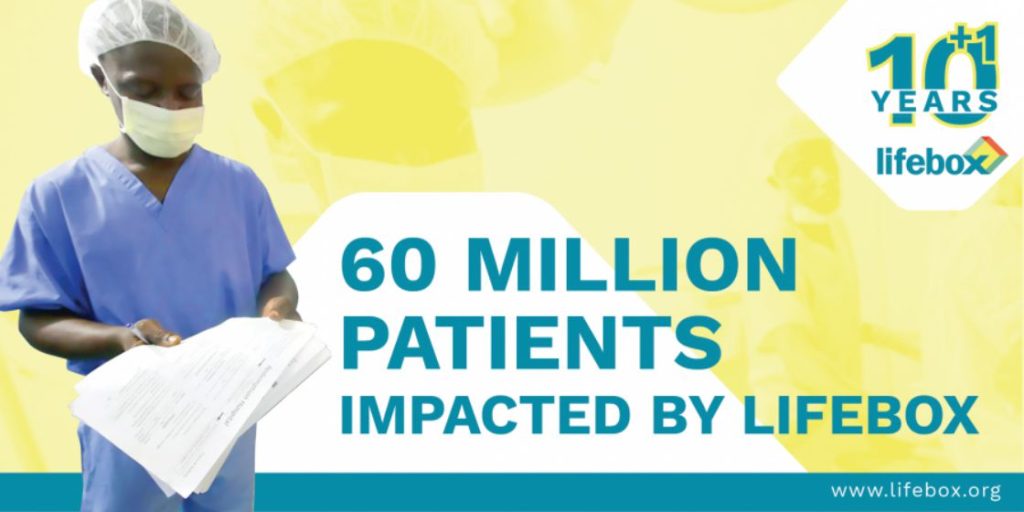
60 MILLION SURGERIES MADE SAFER
We believe that everyone has the right to safe surgical care.
Every year, more than four million people die following surgery – the greatest contributor to death worldwide after heart disease and stroke.1 Millions more suffer from complications and morbidities. Lifebox was founded to tackle the global crisis of unsafe surgery.
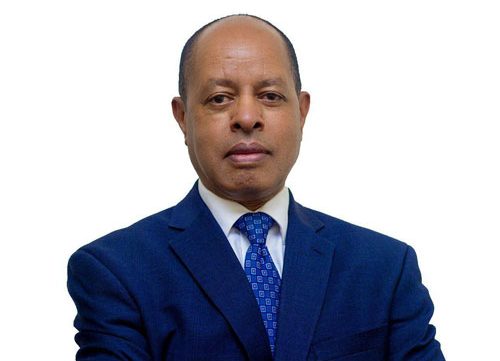
"As a surgeon, it is always heartbreaking when a child dies during surgery. Knowing that had they been born in a different place they would have had access to the necessary care is a difficult burden to bear. We desperately need to focus on safe pediatric surgical care."Professor Miliard Derbew, pediatric surgeon, Rwanda, Lifebox Global Governance Council member
Today, we make surgery safer through tools, training, and partnerships. We focus on three core areas – anesthesia safety, surgical teamwork, and reducing surgical infection – to address critical gaps in surgical systems. So far, our work has made 60 million surgeries safer. Find out more.
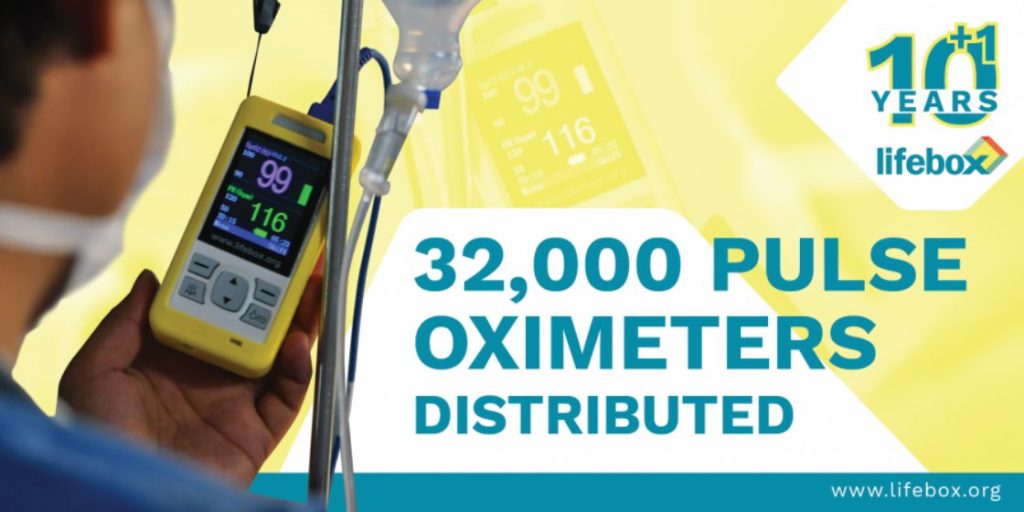
32,000 PULSE OXIMETERS DISTRIBUTED
Since 2011, Lifebox has distributed over 32,000 pulse oximeters to healthcare providers in 116 countries for safer anesthesia and critical care.
A pulse oximeter is an easy-to-use but essential device for monitoring oxygen levels in the blood. It is the only piece of equipment included on the WHO Surgical Safety Checklist and represents the minimum standard for safe anesthesia. Despite this, thousands of anesthesia providers around the world lack access to pulse oximetry – putting patients lives at risk. Lifebox is dedicated to closing this gap.
"The impact of Lifebox has been that we no longer provide anesthesia without a pulse oximeter, we have understood that without it, anesthesia is very dangerous. I can honestly say today, that there's almost no provision of anesthesia, no anesthesia at all, provided without a pulse oximeter, and this is thanks to Lifebox".
Professor Eugene Zoumenou, Chief of Anesthesia at the Hospital for Mothers and Children, Cotonou, Benin, and Director of Anesthesia Education, University of Abomey-Calavi.

IMPACTED 100,000 PATIENTS THROUGH OUR SURGICAL INFECTION REDUCTION PROGRAM: CLEAN CUT
Surgical site infections are a common and devastating complication of surgery. In low- and middle-income countries, surgical patients are twice as likely to suffer from infection than a patient undergoing surgery in the United States.2
The Lifebox Clean Cut program reduces deaths and complications in patients caused by surgical site infections (SSIs) by improving adherence to six essential infection prevention practices. Clean Cut has shown a 35% infection reduction. As a result, we are scaling this work across four countries.
“The morbidity and mortality following surgical site infection is devastating, especially in a country like ours where resources are limited and we are short on personnel. It is essential that we continue to implement a well-designed system to keep safe surgical practices. Clean Cut…makes it clear that it is not only the skill of the OR staff that can save lives, but the adherence to the set forth safety standards as well.”
Dr Assefa Tesfaye, St Peter’s Specialized Hospital – Addis Ababa, Ethiopia

11,000 HEALTHCARE PROVIDERS TRAINED
Training is at the heart of Lifebox’s work. To date, 11,000 healthcare providers have been trained through 280 workshops on surgical and anesthesia safety – whether it is a workshop on pulse oximetry, safer surgical instruments, or strategies for checklist Implementation.
At the onset of the COVID-19 pandemic, Lifebox launched an open access online learning platform – Lifebox Learning Network – to support healthcare providers, wherever they are based, learn best surgical patient safety practice.

INNOVATIONS IN PULSE OXIMETRY
With support from the Bill & Melinda Gates Foundation, Lifebox redesigned the Lifebox oximeter and neonatal probe to optimize use for babies and young children. Pulse oximetry plays a critical role in the diagnosis and treatment of pediatric pneumonia, which kills nearly a million children each year under the age of five. Read more.
“Low blood oxygen levels are a serious, life-threatening, and all too common complication of pneumonia for vulnerable children living in low-resource settings. To date there are few pulse oximeters in resource-poor settings that are suitable for use in children of all ages. As a result, pulse oximetry is poorly implemented and the lives of thousands of children suffering from pneumonia are needlessly at risk.”
Dr. Eric McCollum, pediatric pulmonologist, Johns Hopkins University.

LAUNCHED THE SMILE TRAIN-LIFEBOX SAFE SURGERY AND ANESTHESIA INITIATIVE
Smile Train and Lifebox are united in their work to improve the safety of surgery and anesthesia globally. Smile Train is Lifebox’s longest partner, part of the Lifebox story since our inception in 2011. In 2020 we strengthened our longstanding partnership with the launch of the Smile Train-Lifebox Safe Surgery and Anesthesia Initiative.
“With a shared dedication to supporting safe, high-quality surgery and anesthesia, and a shared passion for scaling innovative technologies that can transform surgical care, Smile Train and Lifebox are now expanding on our history of fruitful collaborations. As a nonprofit whose goal is to empower local medical professionals to treat patients with clefts in their own communities, we are thrilled to be working with Lifebox to bring additional training, education, and other critical resources to our global network of partners.” Smile Train President & CEO Susannah Schaefer. Find out more about the work of this impactful partnership.

A GLOBAL COVID-19 RESPONSE
At the onset of the COVID-19 pandemic, Lifebox consulted with our partners on what they needed and rapidly provided tools and resources for safe surgical, anesthesia, and COVID-19 care. This response ranged from the development of technical guidance to the distribution of personal protective equipment (PPE) and oxygen resources, including 8,800 pulse oximeters for COVID-19 care.
“I supported the distribution of 50 Lifebox pulse oximeters donated to the hospitals in Rivers and Bayelsa States in southern Nigeria for COVID-19 response. There is a shortage of medical equipment in Nigeria so these donations were important to help us provide COVID-19 care. In a COVID-19 patient, the respiratory system of the patient may be compromised. Pulse oximeters help us to screen and assess the oxygen saturation of patients.”
Dr. Dabota Yvonne Buowari, anesthesiologist, University of Port Harcourt Teaching Hospital, Nigeria
Read more about our COVID response.

WORKING TO IMPROVE MATERNAL HEALTH
While cesarean sections (C-sections) are the most frequently performed major operation in the world, patients undergoing C-sections are at risk of surgical site infection (SSI) – a devastating but common complication of surgery. Lifebox works with nine hospitals in Ethiopia to pilot the adaptation of Clean Cut to improve the safety of C-sections – impacting the safety of up to 8,000 women. This work is a randomized control trial as part of the Bill & Melinda Gates Foundation Grand Challenges initiative – funded by UBS Optimus Foundation. Read more.
“Women in Africa are 50 times more likely to die from caesarean section complications than women in high income countries, it’s time we find sustainable solutions to this challenge.”
Dr. Salome Maswime, obstetrician and gynecologist, Clean Cut for C-section Advisory Group member, and Lifebox Board member

EVIDENCE-BASED, ALWAYS
At Lifebox, we are driven by data to inform and shape our work. We evaluate our impact to keep learning and improving. To date, we have published more than 30 articles in peer-reviewed literature – covering subjects from the global uptake of the Surgical Safety Checklist, and program sustainability, to minimum specifications for a surgical headlight.

A GLOBAL ORGANIZATION
In eleven years, Lifebox has grown from a team of two, to a global team of 50 members based across 17 countries. More than half of the Lifebox team are clinicians. Lifebox has set ambitious goals for investing in staff, leadership, and innovation in the regions where we work to reduce our footprint in high-income countries, with 80 percent of the Lifebox team – including the majority of leadership positions – to be based in the Global South by 2024.

STRONGER TEAMS, SAFER SURGERY
Here at Lifebox, we will continue our work for the five in every seven people around the world that do not have access to safe surgery. Through training, tools, and partnerships, we will make surgery and anesthesia safer at 400 hospitals in 20 countries in the next three years. Our vision is a world where every patient has access to safe surgery. Read Lifebox’s strategic plan.
DONATE AND SUPPORT LIFEBOX
Please donate to support Lifebox's next decade of safer surgery milestones.
1 Nepogodiev D, Martin J, Biccard B, Makupe A, Bhangu A, Ademuyiwa A, et al. Global burden of postoperative death. Vol. 393, The Lancet. Lancet Publishing Group; 2019. p. 401
2 Allegranzi B, Bagheri Nejad S, Combescure C, Graafmans W, Attar H, Donaldson L, et al. Burden of endemic health-care-associated infection in developing countries: systematic review and meta-analysis. Lancet Lond Engl. 2011 Jan 15;377(9761):228–41
Since 2011, Lifebox has distributed over 32,000 pulse oximeters to healthcare providers in 116 countries for safer anesthesia and critical care.
A pulse oximeter is an easy-to-use but essential device for monitoring oxygen levels in the blood. It is the only piece of equipment included on the WHO Surgical Safety Checklist and represents the minimum standard for safe anesthesia. Despite this, thousands of anesthesia providers around the world lack access to pulse oximetry – putting patients lives at risk. Lifebox is dedicated to closing this gap.
"The impact of Lifebox has been that we no longer provide anesthesia without a pulse oximeter, we have understood that without it, anesthesia is very dangerous. I can honestly say today, that there's almost no provision of anesthesia, no anesthesia at all, provided without a pulse oximeter, and this is thanks to Lifebox".Professor Eugene Zoumenou, Chief of Anesthesia at the Hospital for Mothers and Children, Cotonou, Benin, and Director of Anesthesia Education, University of Abomey-Calavi.
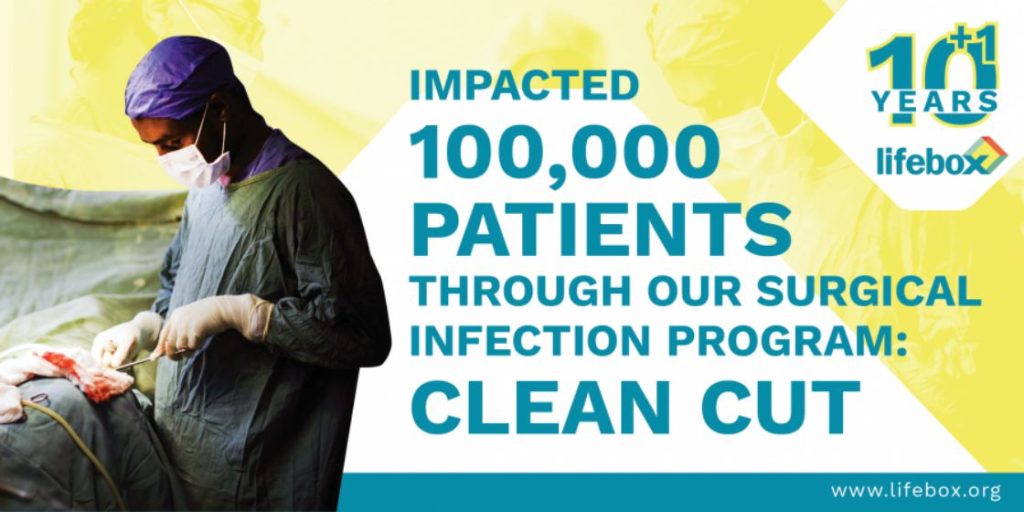
IMPACTED 100,000 PATIENTS THROUGH OUR SURGICAL INFECTION REDUCTION PROGRAM: CLEAN CUT
Surgical site infections are a common and devastating complication of surgery. In low- and middle-income countries, surgical patients are twice as likely to suffer from infection than a patient undergoing surgery in the United States.2
The Lifebox Clean Cut program reduces deaths and complications in patients caused by surgical site infections (SSIs) by improving adherence to six essential infection prevention practices. Clean Cut has shown a 35% infection reduction. As a result, we are scaling this work across four countries.
“The morbidity and mortality following surgical site infection is devastating, especially in a country like ours where resources are limited and we are short on personnel. It is essential that we continue to implement a well-designed system to keep safe surgical practices. Clean Cut…makes it clear that it is not only the skill of the OR staff that can save lives, but the adherence to the set forth safety standards as well.”Dr Assefa Tesfaye, St Peter’s Specialized Hospital – Addis Ababa, Ethiopia
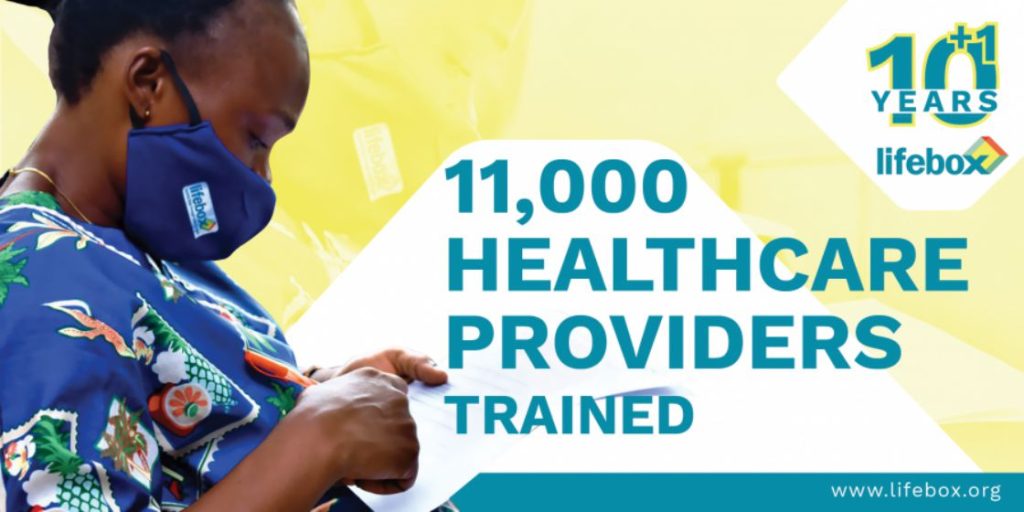
11,000 HEALTHCARE PROVIDERS TRAINED
Training is at the heart of Lifebox’s work. To date, 11,000 healthcare providers have been trained through 280 workshops on surgical and anesthesia safety – whether it is a workshop on pulse oximetry, safer surgical instruments, or strategies for checklist Implementation.
At the onset of the COVID-19 pandemic, Lifebox launched an open access online learning platform – Lifebox Learning Network – to support healthcare providers, wherever they are based, learn best surgical patient safety practice.

INNOVATIONS IN PULSE OXIMETRY
With support from the Bill & Melinda Gates Foundation, Lifebox redesigned the Lifebox oximeter and neonatal probe to optimize use for babies and young children. Pulse oximetry plays a critical role in the diagnosis and treatment of pediatric pneumonia, which kills nearly a million children each year under the age of five. Read more.
“Low blood oxygen levels are a serious, life-threatening, and all too common complication of pneumonia for vulnerable children living in low-resource settings. To date there are few pulse oximeters in resource-poor settings that are suitable for use in children of all ages. As a result, pulse oximetry is poorly implemented and the lives of thousands of children suffering from pneumonia are needlessly at risk.”
Dr. Eric McCollum, pediatric pulmonologist, Johns Hopkins University.

LAUNCHED THE SMILE TRAIN-LIFEBOX SAFE SURGERY AND ANESTHESIA INITIATIVE
Smile Train and Lifebox are united in their work to improve the safety of surgery and anesthesia globally. Smile Train is Lifebox’s longest partner, part of the Lifebox story since our inception in 2011. In 2020 we strengthened our longstanding partnership with the launch of the Smile Train-Lifebox Safe Surgery and Anesthesia Initiative.
“With a shared dedication to supporting safe, high-quality surgery and anesthesia, and a shared passion for scaling innovative technologies that can transform surgical care, Smile Train and Lifebox are now expanding on our history of fruitful collaborations. As a nonprofit whose goal is to empower local medical professionals to treat patients with clefts in their own communities, we are thrilled to be working with Lifebox to bring additional training, education, and other critical resources to our global network of partners.” Smile Train President & CEO Susannah Schaefer. Find out more about the work of this impactful partnership.

A GLOBAL COVID-19 RESPONSE
At the onset of the COVID-19 pandemic, Lifebox consulted with our partners on what they needed and rapidly provided tools and resources for safe surgical, anesthesia, and COVID-19 care. This response ranged from the development of technical guidance to the distribution of personal protective equipment (PPE) and oxygen resources, including 8,800 pulse oximeters for COVID-19 care.
“I supported the distribution of 50 Lifebox pulse oximeters donated to the hospitals in Rivers and Bayelsa States in southern Nigeria for COVID-19 response. There is a shortage of medical equipment in Nigeria so these donations were important to help us provide COVID-19 care. In a COVID-19 patient, the respiratory system of the patient may be compromised. Pulse oximeters help us to screen and assess the oxygen saturation of patients.”
Dr. Dabota Yvonne Buowari, anesthesiologist, University of Port Harcourt Teaching Hospital, Nigeria
Read more about our COVID response.

WORKING TO IMPROVE MATERNAL HEALTH
While cesarean sections (C-sections) are the most frequently performed major operation in the world, patients undergoing C-sections are at risk of surgical site infection (SSI) – a devastating but common complication of surgery. Lifebox works with nine hospitals in Ethiopia to pilot the adaptation of Clean Cut to improve the safety of C-sections – impacting the safety of up to 8,000 women. This work is a randomized control trial as part of the Bill & Melinda Gates Foundation Grand Challenges initiative – funded by UBS Optimus Foundation. Read more.
“Women in Africa are 50 times more likely to die from caesarean section complications than women in high income countries, it’s time we find sustainable solutions to this challenge.”
Dr. Salome Maswime, obstetrician and gynecologist, Clean Cut for C-section Advisory Group member, and Lifebox Board member

EVIDENCE-BASED, ALWAYS
At Lifebox, we are driven by data to inform and shape our work. We evaluate our impact to keep learning and improving. To date, we have published more than 30 articles in peer-reviewed literature – covering subjects from the global uptake of the Surgical Safety Checklist, and program sustainability, to minimum specifications for a surgical headlight.

A GLOBAL ORGANIZATION
In eleven years, Lifebox has grown from a team of two, to a global team of 50 members based across 17 countries. More than half of the Lifebox team are clinicians. Lifebox has set ambitious goals for investing in staff, leadership, and innovation in the regions where we work to reduce our footprint in high-income countries, with 80 percent of the Lifebox team – including the majority of leadership positions – to be based in the Global South by 2024.

STRONGER TEAMS, SAFER SURGERY
Here at Lifebox, we will continue our work for the five in every seven people around the world that do not have access to safe surgery. Through training, tools, and partnerships, we will make surgery and anesthesia safer at 400 hospitals in 20 countries in the next three years. Our vision is a world where every patient has access to safe surgery. Read Lifebox’s strategic plan.
DONATE AND SUPPORT LIFEBOX
Please donate to support Lifebox's next decade of safer surgery milestones.
1 Nepogodiev D, Martin J, Biccard B, Makupe A, Bhangu A, Ademuyiwa A, et al. Global burden of postoperative death. Vol. 393, The Lancet. Lancet Publishing Group; 2019. p. 401
2 Allegranzi B, Bagheri Nejad S, Combescure C, Graafmans W, Attar H, Donaldson L, et al. Burden of endemic health-care-associated infection in developing countries: systematic review and meta-analysis. Lancet Lond Engl. 2011 Jan 15;377(9761):228–41
Training is at the heart of Lifebox’s work. To date, 11,000 healthcare providers have been trained through 280 workshops on surgical and anesthesia safety – whether it is a workshop on pulse oximetry, safer surgical instruments, or strategies for checklist Implementation.
At the onset of the COVID-19 pandemic, Lifebox launched an open access online learning platform – Lifebox Learning Network – to support healthcare providers, wherever they are based, learn best surgical patient safety practice.
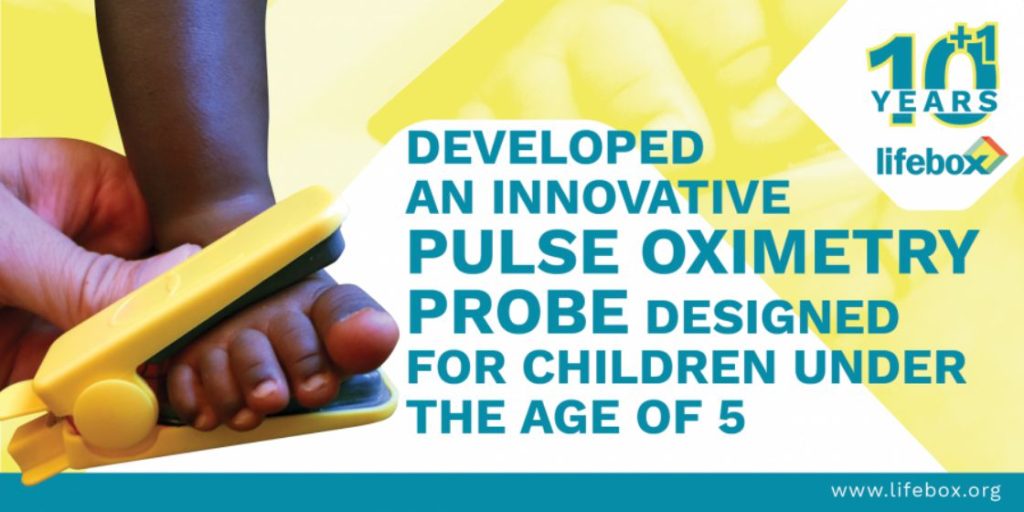
INNOVATIONS IN PULSE OXIMETRY
With support from the Bill & Melinda Gates Foundation, Lifebox redesigned the Lifebox oximeter and neonatal probe to optimize use for babies and young children. Pulse oximetry plays a critical role in the diagnosis and treatment of pediatric pneumonia, which kills nearly a million children each year under the age of five. Read more.
“Low blood oxygen levels are a serious, life-threatening, and all too common complication of pneumonia for vulnerable children living in low-resource settings. To date there are few pulse oximeters in resource-poor settings that are suitable for use in children of all ages. As a result, pulse oximetry is poorly implemented and the lives of thousands of children suffering from pneumonia are needlessly at risk.”Dr. Eric McCollum, pediatric pulmonologist, Johns Hopkins University.
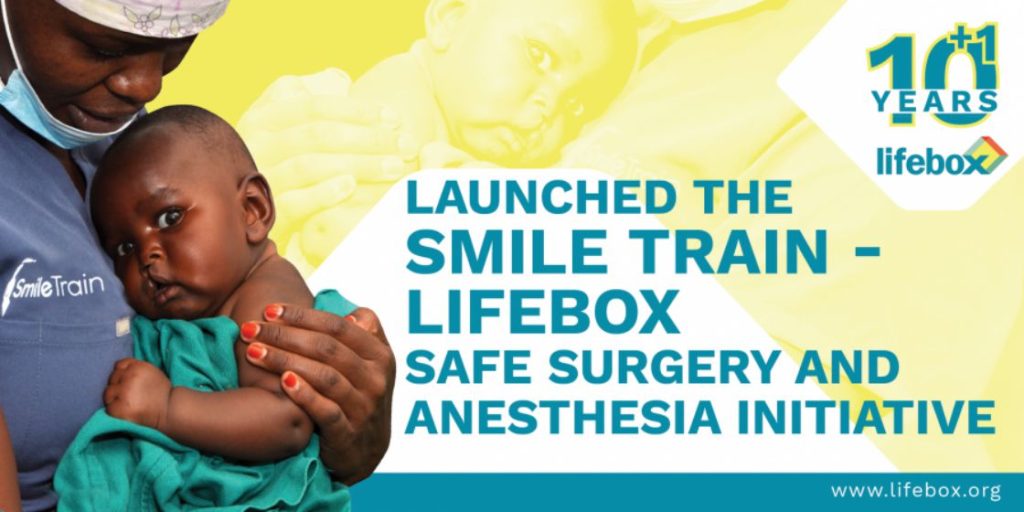
LAUNCHED THE SMILE TRAIN-LIFEBOX SAFE SURGERY AND ANESTHESIA INITIATIVE
Smile Train and Lifebox are united in their work to improve the safety of surgery and anesthesia globally. Smile Train is Lifebox’s longest partner, part of the Lifebox story since our inception in 2011. In 2020 we strengthened our longstanding partnership with the launch of the Smile Train-Lifebox Safe Surgery and Anesthesia Initiative.
“With a shared dedication to supporting safe, high-quality surgery and anesthesia, and a shared passion for scaling innovative technologies that can transform surgical care, Smile Train and Lifebox are now expanding on our history of fruitful collaborations. As a nonprofit whose goal is to empower local medical professionals to treat patients with clefts in their own communities, we are thrilled to be working with Lifebox to bring additional training, education, and other critical resources to our global network of partners.” Smile Train President & CEO Susannah Schaefer. Find out more about the work of this impactful partnership.

A GLOBAL COVID-19 RESPONSE
At the onset of the COVID-19 pandemic, Lifebox consulted with our partners on what they needed and rapidly provided tools and resources for safe surgical, anesthesia, and COVID-19 care. This response ranged from the development of technical guidance to the distribution of personal protective equipment (PPE) and oxygen resources, including 8,800 pulse oximeters for COVID-19 care.
“I supported the distribution of 50 Lifebox pulse oximeters donated to the hospitals in Rivers and Bayelsa States in southern Nigeria for COVID-19 response. There is a shortage of medical equipment in Nigeria so these donations were important to help us provide COVID-19 care. In a COVID-19 patient, the respiratory system of the patient may be compromised. Pulse oximeters help us to screen and assess the oxygen saturation of patients.”
Dr. Dabota Yvonne Buowari, anesthesiologist, University of Port Harcourt Teaching Hospital, Nigeria
Read more about our COVID response.

WORKING TO IMPROVE MATERNAL HEALTH
While cesarean sections (C-sections) are the most frequently performed major operation in the world, patients undergoing C-sections are at risk of surgical site infection (SSI) – a devastating but common complication of surgery. Lifebox works with nine hospitals in Ethiopia to pilot the adaptation of Clean Cut to improve the safety of C-sections – impacting the safety of up to 8,000 women. This work is a randomized control trial as part of the Bill & Melinda Gates Foundation Grand Challenges initiative – funded by UBS Optimus Foundation. Read more.
“Women in Africa are 50 times more likely to die from caesarean section complications than women in high income countries, it’s time we find sustainable solutions to this challenge.”
Dr. Salome Maswime, obstetrician and gynecologist, Clean Cut for C-section Advisory Group member, and Lifebox Board member

EVIDENCE-BASED, ALWAYS
At Lifebox, we are driven by data to inform and shape our work. We evaluate our impact to keep learning and improving. To date, we have published more than 30 articles in peer-reviewed literature – covering subjects from the global uptake of the Surgical Safety Checklist, and program sustainability, to minimum specifications for a surgical headlight.

A GLOBAL ORGANIZATION
In eleven years, Lifebox has grown from a team of two, to a global team of 50 members based across 17 countries. More than half of the Lifebox team are clinicians. Lifebox has set ambitious goals for investing in staff, leadership, and innovation in the regions where we work to reduce our footprint in high-income countries, with 80 percent of the Lifebox team – including the majority of leadership positions – to be based in the Global South by 2024.

STRONGER TEAMS, SAFER SURGERY
Here at Lifebox, we will continue our work for the five in every seven people around the world that do not have access to safe surgery. Through training, tools, and partnerships, we will make surgery and anesthesia safer at 400 hospitals in 20 countries in the next three years. Our vision is a world where every patient has access to safe surgery. Read Lifebox’s strategic plan.
DONATE AND SUPPORT LIFEBOX
Please donate to support Lifebox's next decade of safer surgery milestones.
1 Nepogodiev D, Martin J, Biccard B, Makupe A, Bhangu A, Ademuyiwa A, et al. Global burden of postoperative death. Vol. 393, The Lancet. Lancet Publishing Group; 2019. p. 401
2 Allegranzi B, Bagheri Nejad S, Combescure C, Graafmans W, Attar H, Donaldson L, et al. Burden of endemic health-care-associated infection in developing countries: systematic review and meta-analysis. Lancet Lond Engl. 2011 Jan 15;377(9761):228–41
Smile Train and Lifebox are united in their work to improve the safety of surgery and anesthesia globally. Smile Train is Lifebox’s longest partner, part of the Lifebox story since our inception in 2011. In 2020 we strengthened our longstanding partnership with the launch of the Smile Train-Lifebox Safe Surgery and Anesthesia Initiative.
“With a shared dedication to supporting safe, high-quality surgery and anesthesia, and a shared passion for scaling innovative technologies that can transform surgical care, Smile Train and Lifebox are now expanding on our history of fruitful collaborations. As a nonprofit whose goal is to empower local medical professionals to treat patients with clefts in their own communities, we are thrilled to be working with Lifebox to bring additional training, education, and other critical resources to our global network of partners.” Smile Train President & CEO Susannah Schaefer. Find out more about the work of this impactful partnership.
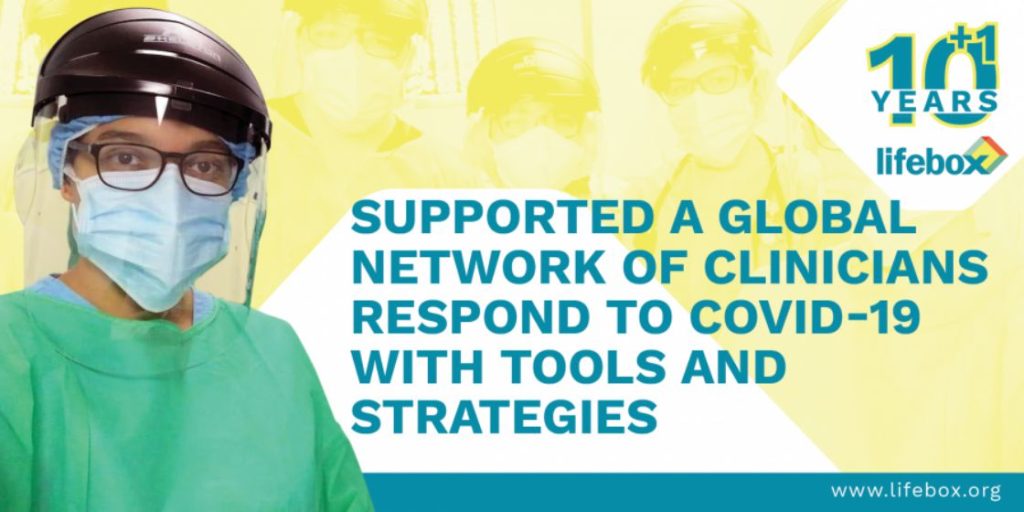
A GLOBAL COVID-19 RESPONSE
At the onset of the COVID-19 pandemic, Lifebox consulted with our partners on what they needed and rapidly provided tools and resources for safe surgical, anesthesia, and COVID-19 care. This response ranged from the development of technical guidance to the distribution of personal protective equipment (PPE) and oxygen resources, including 8,800 pulse oximeters for COVID-19 care.
“I supported the distribution of 50 Lifebox pulse oximeters donated to the hospitals in Rivers and Bayelsa States in southern Nigeria for COVID-19 response. There is a shortage of medical equipment in Nigeria so these donations were important to help us provide COVID-19 care. In a COVID-19 patient, the respiratory system of the patient may be compromised. Pulse oximeters help us to screen and assess the oxygen saturation of patients.”Dr. Dabota Yvonne Buowari, anesthesiologist, University of Port Harcourt Teaching Hospital, Nigeria
Read more about our COVID response.
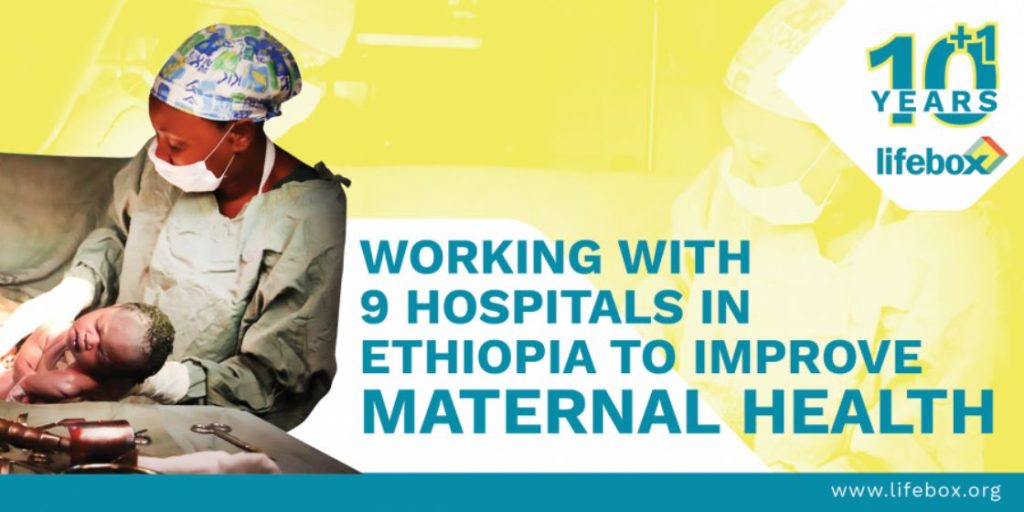
WORKING TO IMPROVE MATERNAL HEALTH
While cesarean sections (C-sections) are the most frequently performed major operation in the world, patients undergoing C-sections are at risk of surgical site infection (SSI) – a devastating but common complication of surgery. Lifebox works with nine hospitals in Ethiopia to pilot the adaptation of Clean Cut to improve the safety of C-sections – impacting the safety of up to 8,000 women. This work is a randomized control trial as part of the Bill & Melinda Gates Foundation Grand Challenges initiative – funded by UBS Optimus Foundation. Read more.
“Women in Africa are 50 times more likely to die from caesarean section complications than women in high income countries, it’s time we find sustainable solutions to this challenge.”
Dr. Salome Maswime, obstetrician and gynecologist, Clean Cut for C-section Advisory Group member, and Lifebox Board member

EVIDENCE-BASED, ALWAYS
At Lifebox, we are driven by data to inform and shape our work. We evaluate our impact to keep learning and improving. To date, we have published more than 30 articles in peer-reviewed literature – covering subjects from the global uptake of the Surgical Safety Checklist, and program sustainability, to minimum specifications for a surgical headlight.

A GLOBAL ORGANIZATION
In eleven years, Lifebox has grown from a team of two, to a global team of 50 members based across 17 countries. More than half of the Lifebox team are clinicians. Lifebox has set ambitious goals for investing in staff, leadership, and innovation in the regions where we work to reduce our footprint in high-income countries, with 80 percent of the Lifebox team – including the majority of leadership positions – to be based in the Global South by 2024.

STRONGER TEAMS, SAFER SURGERY
Here at Lifebox, we will continue our work for the five in every seven people around the world that do not have access to safe surgery. Through training, tools, and partnerships, we will make surgery and anesthesia safer at 400 hospitals in 20 countries in the next three years. Our vision is a world where every patient has access to safe surgery. Read Lifebox’s strategic plan.
DONATE AND SUPPORT LIFEBOX
Please donate to support Lifebox's next decade of safer surgery milestones.
1 Nepogodiev D, Martin J, Biccard B, Makupe A, Bhangu A, Ademuyiwa A, et al. Global burden of postoperative death. Vol. 393, The Lancet. Lancet Publishing Group; 2019. p. 401
2 Allegranzi B, Bagheri Nejad S, Combescure C, Graafmans W, Attar H, Donaldson L, et al. Burden of endemic health-care-associated infection in developing countries: systematic review and meta-analysis. Lancet Lond Engl. 2011 Jan 15;377(9761):228–41
While cesarean sections (C-sections) are the most frequently performed major operation in the world, patients undergoing C-sections are at risk of surgical site infection (SSI) – a devastating but common complication of surgery. Lifebox works with nine hospitals in Ethiopia to pilot the adaptation of Clean Cut to improve the safety of C-sections – impacting the safety of up to 8,000 women. This work is a randomized control trial as part of the Bill & Melinda Gates Foundation Grand Challenges initiative – funded by UBS Optimus Foundation. Read more.
“Women in Africa are 50 times more likely to die from caesarean section complications than women in high income countries, it’s time we find sustainable solutions to this challenge.”Dr. Salome Maswime, obstetrician and gynecologist, Clean Cut for C-section Advisory Group member, and Lifebox Board member

EVIDENCE-BASED, ALWAYS
At Lifebox, we are driven by data to inform and shape our work. We evaluate our impact to keep learning and improving. To date, we have published more than 30 articles in peer-reviewed literature – covering subjects from the global uptake of the Surgical Safety Checklist, and program sustainability, to minimum specifications for a surgical headlight.
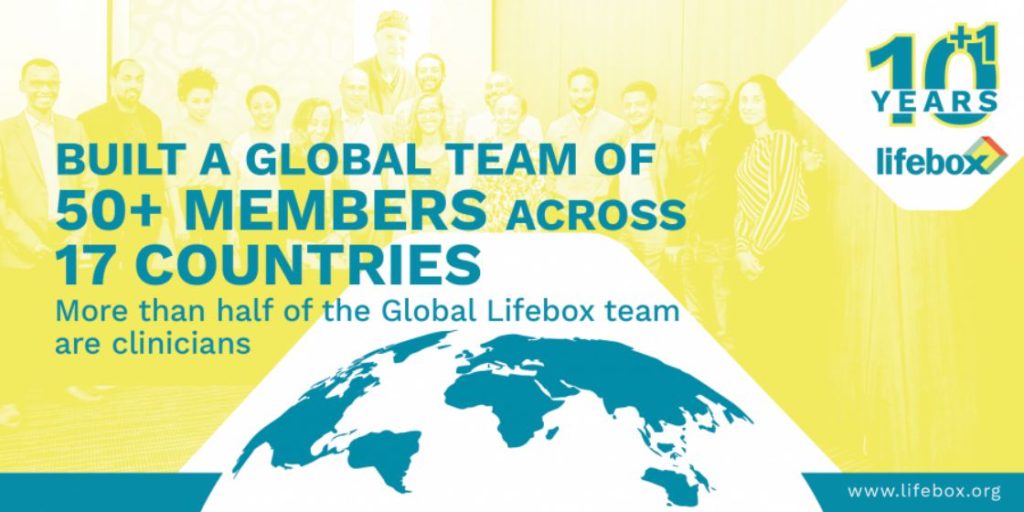
A GLOBAL ORGANIZATION
In eleven years, Lifebox has grown from a team of two, to a global team of 50 members based across 17 countries. More than half of the Lifebox team are clinicians. Lifebox has set ambitious goals for investing in staff, leadership, and innovation in the regions where we work to reduce our footprint in high-income countries, with 80 percent of the Lifebox team – including the majority of leadership positions – to be based in the Global South by 2024.

STRONGER TEAMS, SAFER SURGERY
Here at Lifebox, we will continue our work for the five in every seven people around the world that do not have access to safe surgery. Through training, tools, and partnerships, we will make surgery and anesthesia safer at 400 hospitals in 20 countries in the next three years. Our vision is a world where every patient has access to safe surgery. Read Lifebox’s strategic plan.
DONATE AND SUPPORT LIFEBOX
Please donate to support Lifebox's next decade of safer surgery milestones.
1 Nepogodiev D, Martin J, Biccard B, Makupe A, Bhangu A, Ademuyiwa A, et al. Global burden of postoperative death. Vol. 393, The Lancet. Lancet Publishing Group; 2019. p. 401
2 Allegranzi B, Bagheri Nejad S, Combescure C, Graafmans W, Attar H, Donaldson L, et al. Burden of endemic health-care-associated infection in developing countries: systematic review and meta-analysis. Lancet Lond Engl. 2011 Jan 15;377(9761):228–41
In eleven years, Lifebox has grown from a team of two, to a global team of 50 members based across 17 countries. More than half of the Lifebox team are clinicians. Lifebox has set ambitious goals for investing in staff, leadership, and innovation in the regions where we work to reduce our footprint in high-income countries, with 80 percent of the Lifebox team – including the majority of leadership positions – to be based in the Global South by 2024.
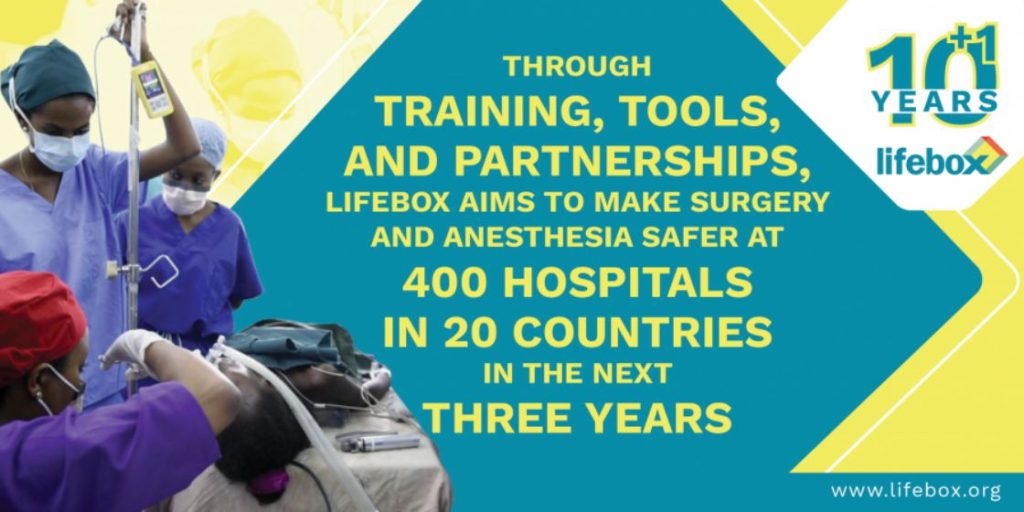
STRONGER TEAMS, SAFER SURGERY
Here at Lifebox, we will continue our work for the five in every seven people around the world that do not have access to safe surgery. Through training, tools, and partnerships, we will make surgery and anesthesia safer at 400 hospitals in 20 countries in the next three years. Our vision is a world where every patient has access to safe surgery. Read Lifebox’s strategic plan.
DONATE AND SUPPORT LIFEBOX
Please donate to support Lifebox's next decade of safer surgery milestones.
1 Nepogodiev D, Martin J, Biccard B, Makupe A, Bhangu A, Ademuyiwa A, et al. Global burden of postoperative death. Vol. 393, The Lancet. Lancet Publishing Group; 2019. p. 401
2 Allegranzi B, Bagheri Nejad S, Combescure C, Graafmans W, Attar H, Donaldson L, et al. Burden of endemic health-care-associated infection in developing countries: systematic review and meta-analysis. Lancet Lond Engl. 2011 Jan 15;377(9761):228–41

